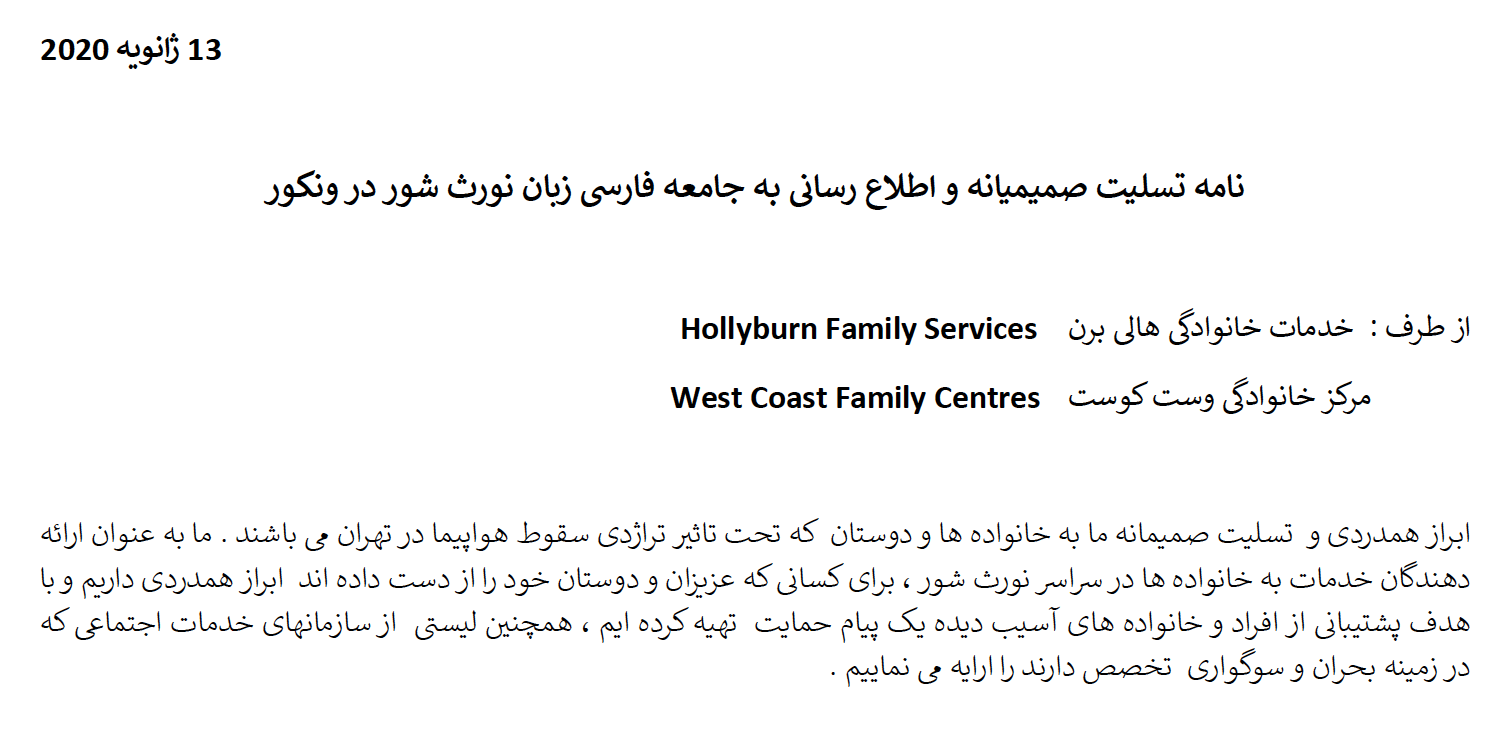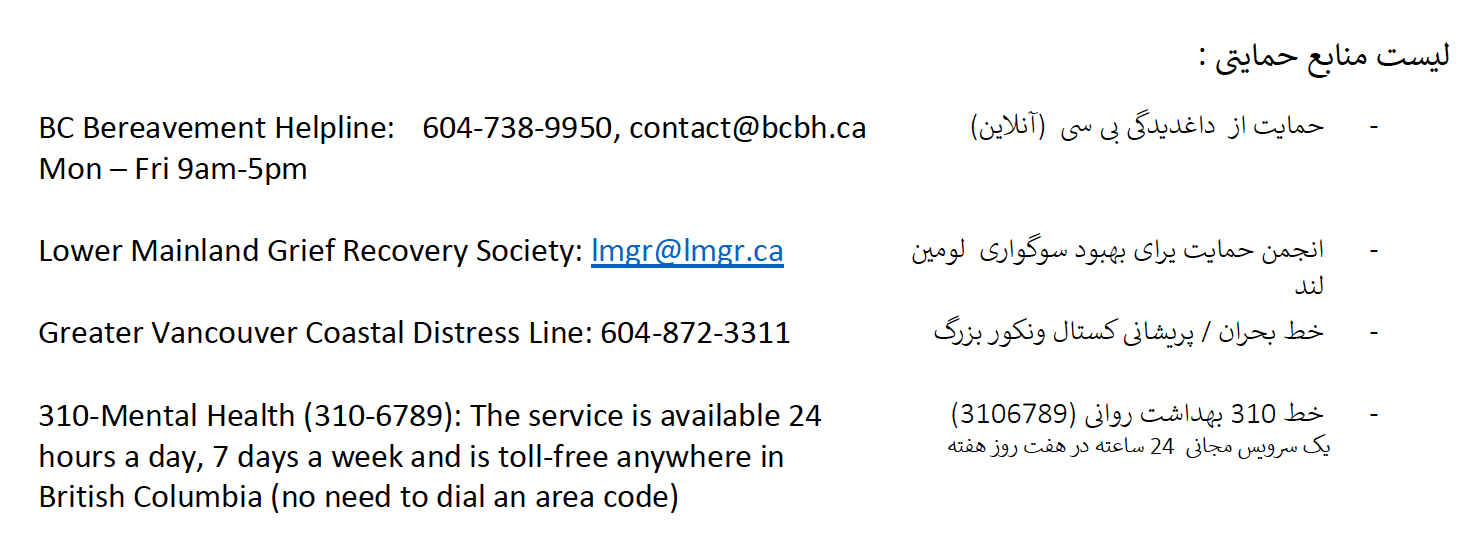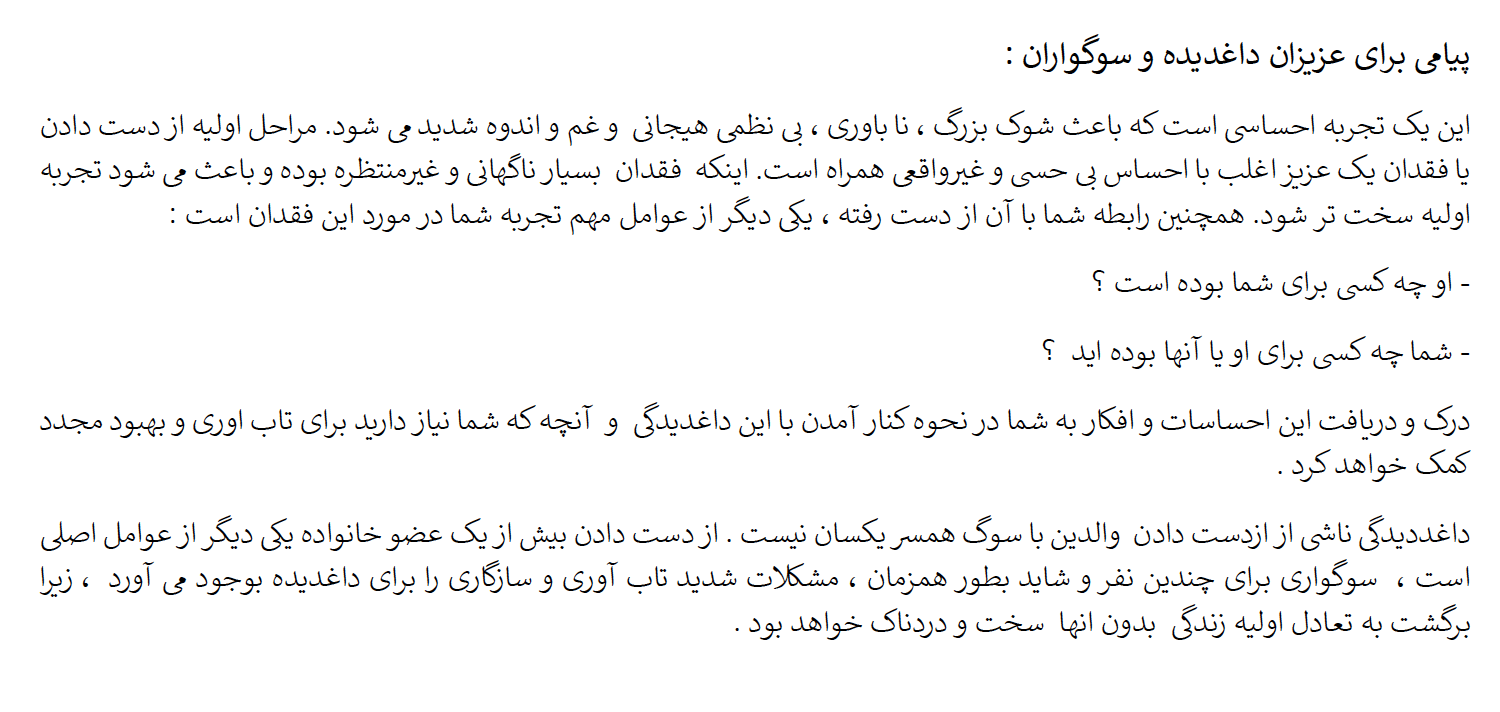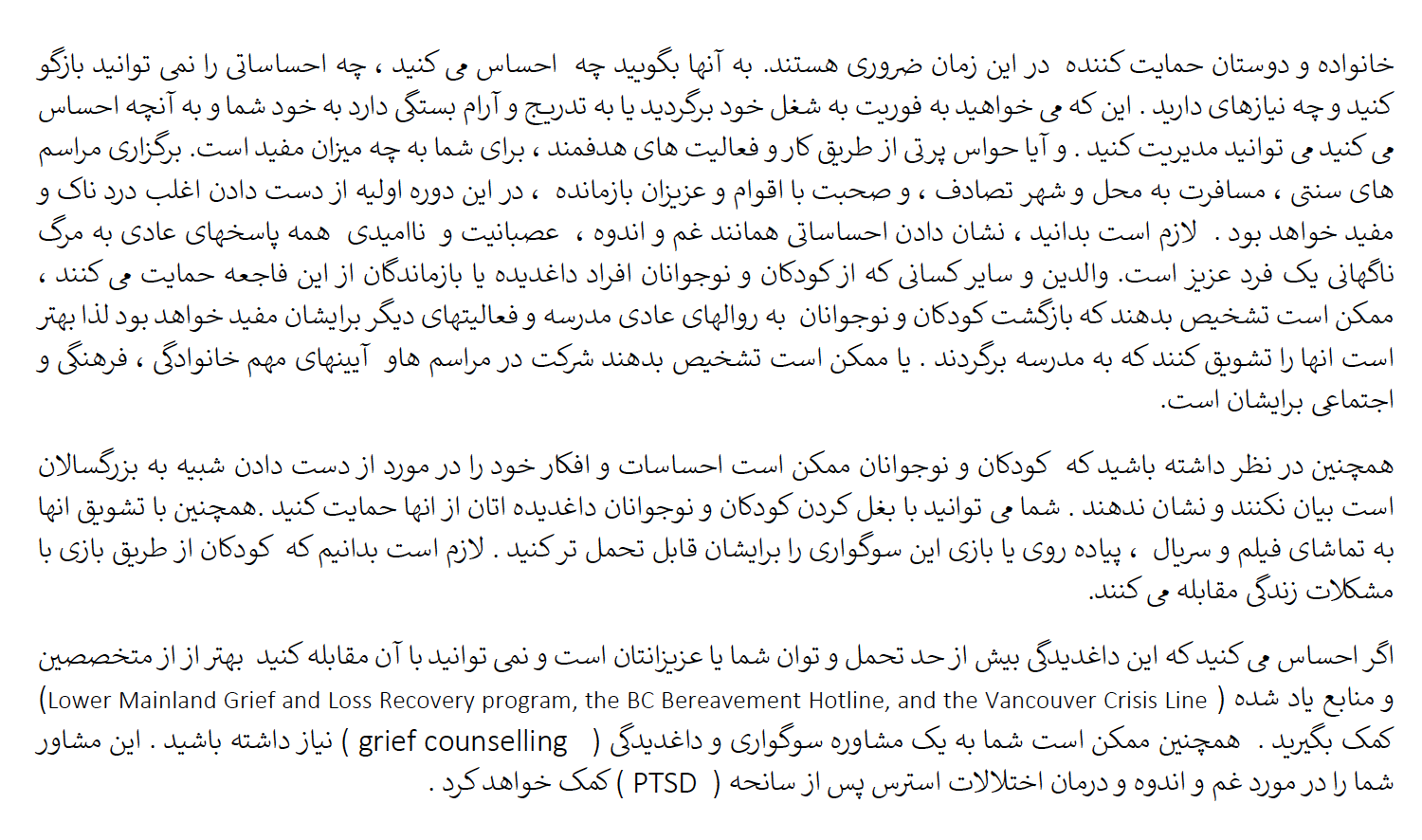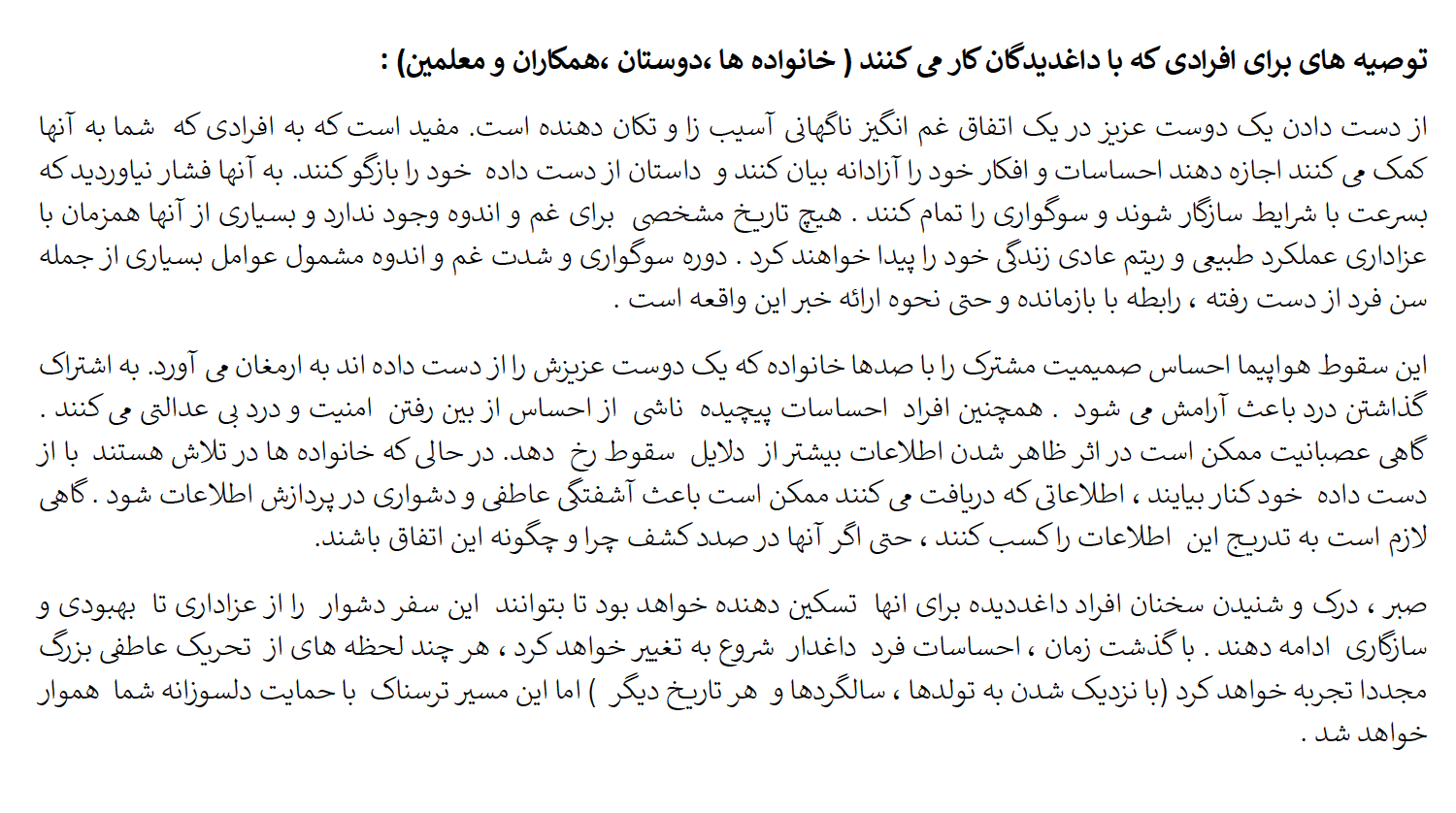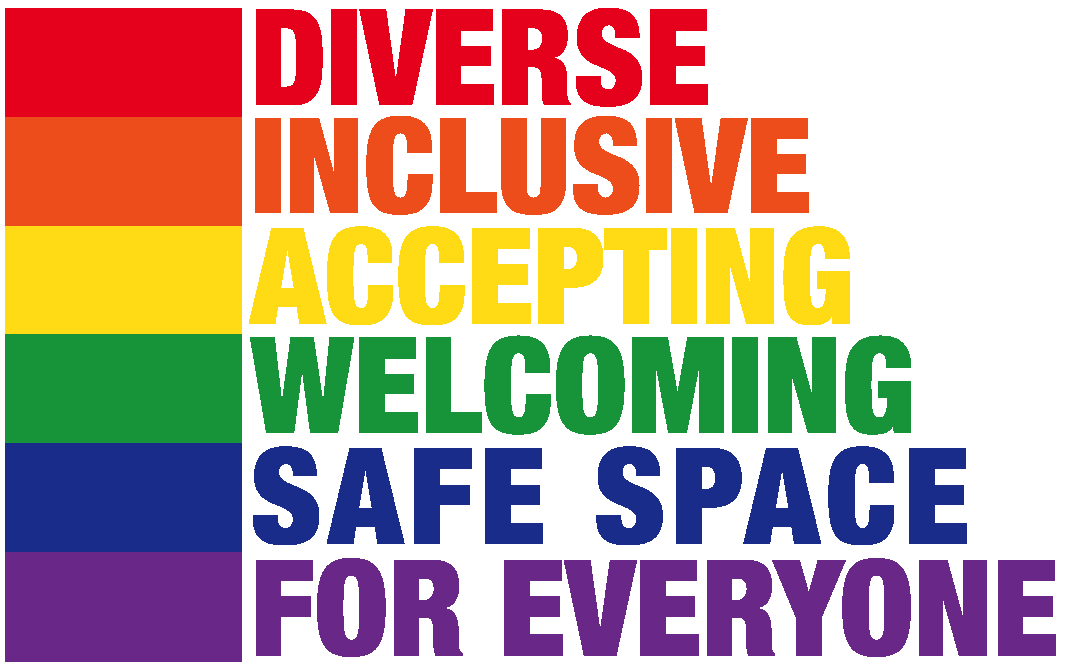An open letter of support to the North Shore Persian community
January 13, 2020
An open letter of support, information, and sincere condolence to members of the North Shore Persian community, and their supporters
From: Hollyburn Family Services and West Coast Family Centres
Our collective thoughts and sincere condolences are with the families and friends effected by the tragic plane crash in Tehran, Iran. As providers of services to families across the North Shore, we aim to provide the community with the following information and support to individuals and families affected by the tragic loss of members of our community. For those grieving the loss of loved ones, we offer the following message of support, and a list of social service organizations that specialize in addressing crisis and loss. We also offer information to the community of supporters of the bereaved.
- BC Bereavement Helpline: 604-738-9950, email hidden; JavaScript is required Mon – Fri 9am-5pm
- Lower Mainland Grief Recovery Society: email hidden; JavaScript is required
- Greater Vancouver Coastal Distress Line: 604-872-3311
- 310-Mental Health (310-6789): The service is available 24 hours a day, 7 days a week and is toll-free anywhere in British Columbia (no need to dial an area code)
For the bereaved:
This experience is one that engenders great shock, disbelief, disorientation, and deep anguish. The early stages of a loss are often accompanied by feelings of numbness, and unreality. That the loss was so sudden and unexpected makes the initial experience all the more difficult. The relationship to the deceased is another significant factor in your experience of this loss: who they were to you and who you were to them matters most when it comes to how you feel, how you cope, and what you will need by way of emotional and practical support to see you through mourning and recovery. The loss of a parent is not the same as the loss of a spouse. The loss of more than one family member is another key factor, and such multiple losses may challenge your ability to cope, at times, as you begin the difficult and painful adjustment to life without them.
Supportive family and friends are essential at this time. Knowing what you feel you can show up for, and not show up for is also important. Whether a return to work is immediate, deferred, or gradual depends greatly on your own preference for what you feel you can manage, and whether the distraction of work and purposed activities are helpful. Rituals including local vigils, travel to the site of the crash, and speaking to surviving relatives and loved ones abroad are often helpful –albeit painful — in this initial period of loss. Expressions of grief including anger, sadness, outrage, frustration are all normal responses to the sudden death of a loved one. Parents and others who are supporting child and teen survivors of this tragedy may consider that encouraging a return to normal routines of school and other activities may be helpful, in addition to participation in important family, cultural, and community rituals of remembrance. Consider also that children and teens may not express verbally their feelings and thoughts about the loss in the way that is more typical of adults. Offering comfort by way of hugs, practical gestures, connecting activities (watching a movie, going for a hike, playing a game) are helpful to support your younger family members. Children deal with life’s difficulties through play. Parents and family members are encouraged to see that opportunities for play continue despite the loss.
Those who are feeling that the enormity of the loss is greater than what they can cope with are encouraged to consider more formal sources of help. This may include services provided by groups such as the Lower Mainland Grief and Loss Recovery program, the BC Bereavement Hotline, and the Vancouver Crisis Line. It may also include grief counselling, which can aid in cases of complicated grief, and the treatment of post traumatic stress disorder (PTSD) which presents as an acute response to grieving and disrupted adjustment in the months following a traumatic loss.
For those supporting the bereaved (family, friends, co-workers, teachers):
Losing a loved one to a sudden tragic event is traumatic and shocking. It’s helpful to allow those who turn to you for support to speak their feelings and thoughts freely, and tell their story of loss as it unfolds for them. Try not to hold expectations for the bereaved to “get over” their loss. There is no deadline for grief, and many will find their rhythm as they mourn and function through their daily lives. The period of mourning and the intensity of grief are subject to many factors that include the age of the deceased, the relationship to the survivor, and even the way the news of the event and the loss of life was presented.
This plane crash brings with it a feeling of shared grief with the hundreds of families who lost a loved one. There can be solace in knowing one’s own pain is shared by others. But it also brings a sense of unreality to the experience, the potential for complicated feelings arising from the lost sense of safety, and the pain of injustice. Anger and outrage may surface as more information emerges from the scene of the crash. As families attempt to come to terms with their loss, the information they receive may be difficult to process amid the emotional turmoil. Many will need to take information in smaller doses, even as they strive desperately for answers to why and how this could have happened.
Patience, understanding, comforting words, and helpful offers of practical and emotional support are all necessary to aiding the bereaved to begin their difficult journey through mourning and recovery. Resilience is helped by tolerance for the other’s pain as it is expressed verbally, physically, and through actions that may, for a period of time, resemble a withdrawal from normal activities and routines. Encouraging the bereaved to take life one step at time is helpful. Sharing your own experience of loss and recovery may also prove supportive and inspire hope that life will, once again, be lived with joy.
With time the grieving person experiences a change in the intensity of the pain, and the frequency of “grief bursts” – moments of great emotional upheaval at the sudden realization that person is really gone, and not coming back. Birthdays, anniversaries, and seasonal changes all mark the passing. Each date on the calendar also marks another day of adjustment to life after the loss. The bereaved walk a path that is their own, but one that is made brighter and less daunting with the compassionate support of others.
